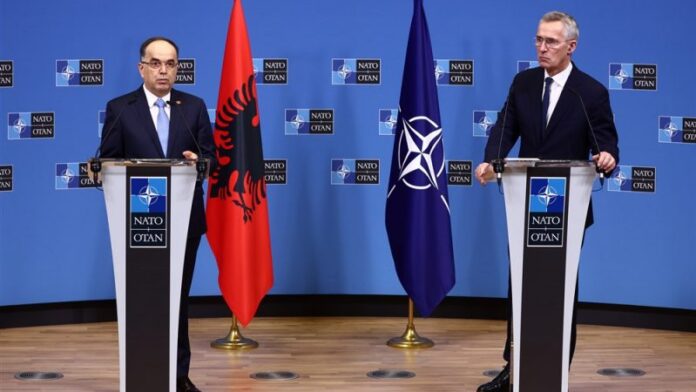NATO Secretary General Jens Stoltenberg praised Albania for its key role in promoting stability in the Western Balkans during a meeting with President Bajram Begaj at the Alliance’s headquarters in Brussels on Tuesday, according to Euractiv.
Albania has been a member of NATO since April 2009 and it is a part of key deployments in Latvia, Bulgaria, Kosovo, and Iraq, as well as being host to a NATO airbase in the city of Kucova.
The Secretary General thanked the president, a former military officer, Albania, for playing a pivotal role in promoting stability and cooperation across the Western Balkans, a region of strategic importance to NATO.
“And it is great to have a President of Albania that knows NATO so well as you do. Because you have been the Chief of Defence of a country, and therefore, we all know that you know this Alliance in many, many different ways. And that is a strength for all of us and the whole organisation,” the NATO chief said, adding, “Albania is a valued Ally with a long history of stepping up to support NATO Allies and partners.”
He praised the country for responding quickly to the devastating Turkey-Syria earthquake by sending search and rescue medical personnel and “promoting stability and cooperation across the Western Balkans.”
Stoltenberg thanked the country for ratifying the Accession Protocols for Finland and Sweden’s NATO bid so quickly, demonstrating “Albania’s strong commitment to our Alliance.”
But the secretary-general also pledged NATO’s support to Albania, including fighting the cyberattacks that brought government institutions to a standstill in 2022 and investing in the Kucova airbase, which will “enhance the security of your air space”.
Stoltenberg also spoke on Kosovo and Serbia, including ongoing tensions and EU and US-led bids to normalise relations. He noted that the NATO-led KFOR presence has a vital role in promoting stability and peace while ensuring freedom of movement for all groups.
Amid December and January’s tensions which saw ethnic Serbs block arterial roads in the north, leading to border closures, KFOR was instrumental in keeping the peace, removing the blockades, and restoring freedom of movement.
“The KFOR presence of the NATO troops supports the diplomatic efforts of the European Union, and I welcome the recent talks that were held here in Brussels, as part of the EU facilitated dialogue between Pristina and Belgrade…because we believe that that’s the only viable path forward to a solution and stability in Kosovo,” he said.
He added this is a “historic opportunity for lasting peace” which could benefit the entire region but that both sides must show “flexibility and readiness to compromise”.


